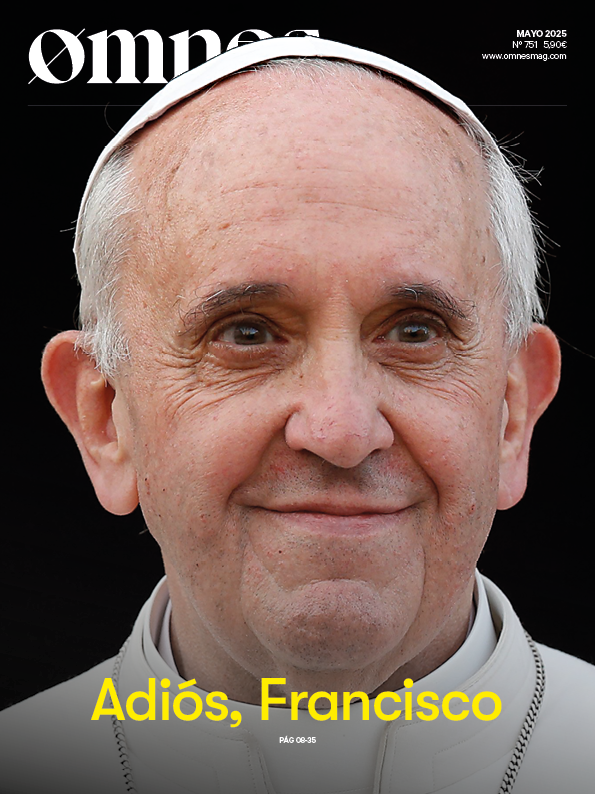Natalia Santoro has been reflecting and deepening, for years, about the figure and the task of women in society, the family and the Church. A highly topical issue and that, as has been highlighted on different occasions especially by recent popes, is of great importance in a society that seems to reduce feminism to the imposition of women over men.
- There is much talk about the "role" of women in the Church and in society, but is it simply a role, a number or a quota that determines the influence of women in the life of the Church?
To talk about the "role of women" is to talk about the "why" and "what for" of our existence as women, i.e.: What does a woman contribute to the world?because she is a woman"?
"I thank you, woman, by the very fact of being a woman! With the intuition of your own femininity you enrich understanding of the world y you contribute to the full truth of human relationships," said St. John Paul II in his 1995 Letter to Women.
We know that the radical difference between men and women is sexuality. Ignoring, annulling or dissimulating the manifestations of our sexuality is not intrinsic femininity is a great loss. Eva means "mother of mankind".and Jesus ends his life on earth by going to the Woman of heaven on earth: Mariathe New Eve: "Woman there is your child".
Motherhood is much more than the act of being a biological mother, is the essentially feminine quality of the woman that is imprinted in her whole being.The mistake is to interpret being a mother with womanly, soft or good-natured attitudes in the style of the feminine ideology of Snow White or Cinderella. The mistake is to interpret being a mother with womanly, soft or good-natured attitudes in the style of the feminine ideology of Snow White or Cinderella; and not being a mother, with the witch or the stepmother.
Women are also called to rule the earth: And God blessed them and said to them, "Be fruitful and multiply, fill the earth and subdue it". This task is entrusted equally to men and women; therefore, the presence of women in all public and private environments is necessary. Moreover, the presence of women in all public and private environments is necessary, "it is not good for man to be alone."human being, man and woman cannot be happy by excluding each other.
The female drama throughout history consists in the fact that women have been looked at with short-range lights, with a vision that reduced our personal capacities to the domestic sphere or as subordinates, without the consideration that is due to us, in the same position as a man, on an equal footing.
The Church as the people of God is imbued with the culture of her time, but she is also enlightened to propose a truth about women that is higher, deeper and more revolutionary since the very coming of Jesus.
The Message to Women (Paul VI, Closing of the Second Vatican Council, 1965.) is very revealing in terms of concrete manifestations of that maternal vocation which, in a spiritual sense, has a lot to do with mercy and care for human frailty, but also with fortitude, courage and moral authority in relation to human life: "Reconcile men with life. And above all, we beseech you, watch over the future of our species. Stop the hand of man who in a moment of madness would attempt to destroy human civilization."
In order to fulfill the mission entrusted by God himself, women need to be received by men with a clean and intelligent gaze, to realize that their difference, together with the human talents they may have developed, is what is needed to fulfill God's desire to rule the world. Now, this will not be possible in a dynamic of confrontation and struggle for roles, quotas or powers, but in a dynamic of trust and unity.
-What does what St. John Paul II called the feminine genius bring to the Church?
St. John Paul II was a contemporary of the protagonists of the sexual revolution of 1968 and the rise of feminism; he responded by welcoming women, understanding their position and their rebelliousness. "not without errors"He acknowledged history's debt to women, thanked them, each and every one, and dedicated years of his life to writing and announcing the dignity of women.She denounced all the contrary social inertias: for example, the instrumentalization of women as objects for the satisfaction of the male ego, the artifice in the expression of love, the responsibility of men as accomplices and provocateurs of abortion, and above all she denounced sexual abuse and violence against women.
St. John Paul II had the brilliance to coin that new term that so many women today are looking for to overcome the false feminism that stifles femininity in all its manifestations: the female genius. The Pope of women contemplates the essence of being a woman in its original version, the New Eve, the woman created by God redeemed from all malice in advance, from her conception. Mary is the feminine genius par excellence, the transcendent woman, the eternal woman. God expresses himself in the woman differently from man (for trying to express the inexplicable).
Mary is the only model for woman: in her her vocation is fully fulfilled. She is essentially mother: she receives all gifts through her intimate and intimate configuration with the Son. Mary is Virgin, the Immaculate, without stain of sin, full of the Holy Spirit, full of joy and enthusiasm, energy and strength. Therefore, in her is unfolded the highest aspiration of woman in this world, as mother and virgin, in intimate union with God.
-As a woman, as a Catholic working in a "Catholic environment", do you miss any issues, do you feel equally recognized?
With hard work and patience, recognition comes by itself. I believe that collaboration in peace generates spontaneous recognition, seeing that we are moving forward together and are happy. This does not mean allowing ourselves to be subjugated or not having the strength to disagree, or to stop claiming what is due to us in conscience.
-Is there perhaps a politicization of the concept of "women's participation" in the Church as well?
To transfer the organizational structures of a company or a State to the ecclesiastical sphere, from an organizational point of view, can be appropriate. To transfer these functional schemes to the "spiritual" order would be like applying accounting to conversions, or commercial law to relations between brothers. It seems to me something ugly from the outset, which does not fit, but it is a confusing terrain: it is easy to jump from one side to the other and fall into quicksand.
-What women do you consider to be examples of work or influence in the Church?
My first reference in the way of being a woman is my mother and the women in my family, of course. I also believe in what Pope Francis says: are the hidden dynamismsIt is the ordinary men and women who really change our history.
There are men who confirm us in our mission as women: the father, the husband, also saints who teach us a way.
Thanks to these seeds, and to all that God watered afterwards, there have been many women who have been a reference for me. But there is one woman in particular who displayed a delicate and exquisite femininity in unraveling the teachings of John Paul II and female genius so that they could be digested and assimilated by many other women: Jutta Burggraf. I think she has marked a before and after for many people, men and women; through her writings on Christian feminism, she provides us with the essential antidote to the challenges of the 21st century.








